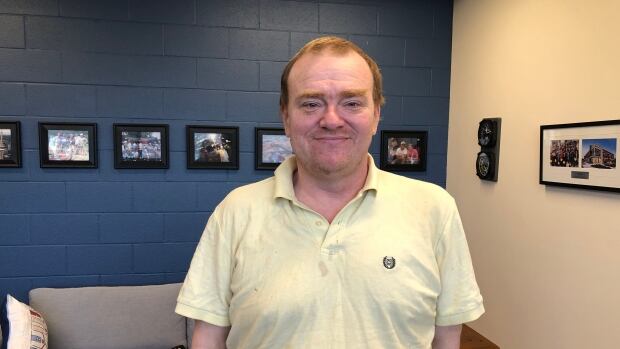A coalition of anti-poverty and disability groups is calling on the federal government to fully fund a new federal disability benefits program and keep its promise to bring all state disability program recipients’ incomes above the poverty line.
Many advocates who supported Bill C-22 are now concerned that the 2024 federal budget still won’t provide the funding needed to make a real difference in the lives of people with disabilities.
One of them is Bobby Giles, who is unable to work because of schizophrenia and a leg problem.
The Toronto resident now relies on $1,382 from the Ontario Disability Assistance Program, $113 in special dietary expenses for his diabetes, a supportive church community and a food bank, leaving him with little financial freedom to meet life’s basic needs and wants.
“The system is broken,” Giles said Friday at the Daily Bread food bank west of Toronto. “Stable funding for people with disabilities would help curb food bank use, which is at an all-time high as too many people are forced to choose between rent and food.”
Bill C-22, which passed unanimously in June, was meant to help lift people like Giles out of poverty by topping up provincial assistance funding. But the program has yet to be funded or fully designed, and many fear the budget, due to be released in March or April, won’t provide the funding it needs.
Giles says funding federal welfare and making sure everyone has enough assets would give them the simple financial freedom they don’t currently have. When asked what he would do if he had more money each month to improve his life, he says his dreams are small.
“For me, it’s lactose-free milk. It’s like $7.”
Supporters say benefits should be about $1,000 per person per month
Neil Hetherington, CEO of the Daily Bread Food Bank, the group leading the effort, said $10 billion to $12 billion in federal funding would be needed to bring disability program recipients above the poverty line.
He said about 1 million people nationwide rely on inadequate state disability benefit systems.
Hetherington said the poverty line in Toronto is about $2,300 a month, so if people with disabilities receive less than $1,400 a month in provincial benefits, the federal top-up would need to be closer to $1,000 a month.
A meeting between advocacy groups and the Treasury in December did not reassure Hetherington and his colleagues.
Hetherington said The Daily Bread and others told Treasury officials that between $10 billion and $12 billion was needed.
“They met our expectations. They said, ‘Listen, we’re talking about a federal deficit. We have to think about this at a time when interest rates and debt-service costs are rising.’ That’s the typical comment we hear about austerity.”
 Neil Hetherington, CEO of the Daily Bread Food Bank, says $10 billion to $12 billion in national disability benefits is needed to lift people currently receiving provincial disability benefits out of poverty.(Clara Pasieca/CBC)
Neil Hetherington, CEO of the Daily Bread Food Bank, says $10 billion to $12 billion in national disability benefits is needed to lift people currently receiving provincial disability benefits out of poverty.(Clara Pasieca/CBC)
He said advocates were under the impression that people with disabilities should not expect the amount requested, and that despite expectations for the program, it will not be fully funded in the budget.
The federal government is tight-lipped about the numbers.
CBC Toronto asked the Ministry of Finance about these figures and the concerns.
“We cannot speculate on what may or may not be included in the next federal budget,” Finance Minister spokeswoman Katherine Kupplinskas said in an emailed statement.
It is common for governments to not answer questions about specific funding allocations before the budget is presented.
“Strengthening the economic security of Canadians with disabilities and removing the barriers that prevent them from being fully included in our communities are key pillars of Canada’s first-ever Disability Inclusion Action Plan and the Accessible Canada Act,” Laurent de Casanove, spokesman for Minister of Diversity, Inclusion and Disabilities Kamal Khera, said in a statement.
De Casanove said the government was speaking to many members of the disability community to ensure their perspectives were reflected in the benefits.
“We are focused on getting benefits to eligible Canadians as quickly as possible,” de Casanove said.
Funding shortfalls could be costly, advocates say
Disability and anti-poverty groups are calling for public support: As of February 9, Canadians had written nearly 60,000 letters to politicians in support of fully funding federal disability benefits, according to the Daily Bread Food Bank.
 Rabiya Khedr, national director of the Disability End Poverty Campaign, worries that national disability benefits will run out of funding. (Andrew Nguyen/CBC)
Rabiya Khedr, national director of the Disability End Poverty Campaign, worries that national disability benefits will run out of funding. (Andrew Nguyen/CBC)
Rabiya Khedr, national director of disability advocacy group Disabled Without Poverty, said bringing people with disabilities above the poverty line was the bare minimum, and many of them face high costs for things like assistive devices that aren’t fully covered and other necessities.
She chooses to remain hopeful, but is “concerned” that the government is not putting enough funding into the program in the upcoming budget.
“I think there’s going to be a lot of disappointment and damage,” she said. “The trust-building that’s been built is going to be undermined by inadequate amounts. And the health and well-being of people who are suffering now is actually going to get worse.”
She says the government should carefully consider the costs of not fully funding the program in this budget.
“People are suffering. They are falling deeper into poverty,” she said. “People with disabilities may end up needing more support and services through health and social services than they would if their basic needs were met.”

